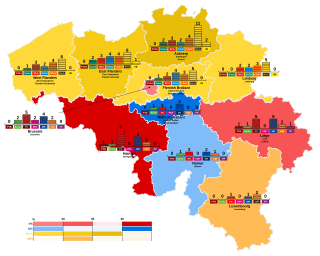 |
|---|
National Rally (French : Rassemblement National, RN) was a political party in Belgium led by Jean Evrard, who was previously member of the Christian Social Rally of Liberty. [1]
 |
|---|
National Rally (French : Rassemblement National, RN) was a political party in Belgium led by Jean Evrard, who was previously member of the Christian Social Rally of Liberty. [1]
In the 1961 general elections the party received 0.8% of the vote and won a single seat in the Chamber of Representatives. [2] It did not contest any further elections. [3]

The politics of Belgium take place in the framework of a federal, representative democratic, constitutional monarchy. The King of the Belgians is the head of state, and the prime minister of Belgium is the head of government, in a multi-party system. Executive power is exercised by the government. Federal legislative power is vested in both the government and the two chambers of parliament, the Senate and the Chamber of Representatives. The federation is made up of (language-based) communities and (territorial) regions. Philippe is the seventh and current King of the Belgians, having ascended the throne on 21 July 2013.

Voeren is a Flemish Dutch-speaking municipality with facilities for the French-speaking minority, located in the Belgian province of Limburg. Bordering the Netherlands to the north and the Wallonia region's Liège Province to the south, it is geographically detached from the rest of Flanders, making Voeren an exclave of Flanders. Voeren's name is derived from that of a small right-bank tributary of the Meuse, the Voer, which flows through the municipality.
Vooruit is a Flemish social democratic political party in Belgium. It was known as the (Flemish) Socialist Party until 21 March 2021, when its current name was adopted.

Elio Di Rupo is a Belgian politician who has served as the minister-president of Wallonia since 2019. He is affiliated with the Socialist Party. Di Rupo previously served as the prime minister of Belgium from 6 December 2011 to 11 October 2014, heading the Di Rupo Government. He was the first francophone to hold the office since Paul Vanden Boeynants in 1979, and the country's first socialist prime minister since Edmond Leburton left office in 1974. Di Rupo was also Belgium's first prime minister of non-Belgian descent, and the world's second openly gay person and first openly gay man to be head of government in modern times.

DéFI is a social-liberal and regionalist political party in Belgium mainly known for defending French-speakers' interests in and near the Brussels region. Founded in 1964, the party is led by François De Smet, a member of the Chamber of Representatives. The party's current name, DéFI or Défi, was adopted in 2016 and is a backronym of Démocrate, Fédéraliste, Indépendant meaning "challenge" in French.

The Socialist Party is a social democratic French-speaking political party in Belgium. As of the 2019 elections, it is the third largest party in the Belgian Chamber of Representatives and the largest Francophone party. The party is led by Paul Magnette. The party supplies the Minister-president of the French Community, and the Brussels-Capital Region. In the German-speaking community, the party is known as the Sozialistische Partei (SP).

The Workers' Party of Belgium is a Marxist and socialist political party in Belgium. It is the only Belgian party represented in parliament that is a fully national party, representing both Flanders and Wallonia. Having historically been a small party, the PTB-PVDA has gained momentum since the 2010s, continuously scoring better at the elections, particularly in Wallonia and working-class communities in Brussels.

The Federal Parliament is the bicameral parliament of Belgium. It consists of the Chamber of Representatives and the Senate. It sits in the Palace of the Nation. The Chamber of Representatives is the primary legislative body; the Senate functions only as a meeting place of the federal communities and regions.

The Senate is one of the two chambers of the bicameral Federal Parliament of Belgium, the other being the Chamber of Representatives. It is considered to be the "upper house" of the Federal Parliament. Created in 1831 as a chamber fully equal to the Chamber of Representatives, it has undergone several reforms in the past, most notably in 1993 and 2014. The 2014 elections were the first without a direct election of senators. Instead, the new Senate is composed of members of community and regional parliaments and co-opted members. It is a chamber of the communities and regions and serves as a platform for discussion and reflection about matters between these federated entities. The Senate today plays a minor role in the federal legislative process. However, the Senate, together with the Chamber, has full competence for the Constitution and legislation on the organization and functioning of the Federal State and the federated entities. Since the reform of 2014, it holds about ten plenary sessions a year.

Vlaams Belang is a Flemish nationalist, and right-wing populist political party in the Flemish Region and Brussels Capital Region of Belgium. It is widely considered to be on the political far-right.

Elections in Belgium are organised for legislative bodies only, and not for executive functions. Direct elections take place for the European Parliament, the Chamber of Representatives, the Parliaments of the Regions, the Parliaments of the Communities, the provincial councils, the municipal councils and the councils of Districts of Antwerp. Voting is mandatory and all elections use proportional representation which in general requires coalition governments.

The Federal Government of Belgium exercises executive power in the Kingdom of Belgium. It consists of ministers and secretary of state drawn from the political parties which form the governing coalition. The federal government is led by the prime minister of Belgium, and ministers lead ministries of the government. Ministers together form the Council of Ministers, which is the supreme executive organ of the government.

The Chamber of Representatives is one of the two chambers in the bicameral Federal Parliament of Belgium, the other being the Senate. It is considered to be the "lower house" of the Federal Parliament.

Federal elections were held in Belgium on 10 June 2007. Voters went to the polls in order to elect new members for the Chamber of Representatives and Senate.
The Catholic Party was a Belgian political party established in 1869 as the Confessional Catholic Party.

The Rassemblement Wallonie France is a small political party in Belgium. It is active in Wallonia and the Brussels-Capital Region. In Brussels it is known as the Rassemblement Bruxelles France or RBF. Its aim is the secession of Wallonia, Brussels and the six Flemish municipalities with language facilities for French-speakers around Brussels from Belgium and to unite them with France.

Federal elections were held in Belgium on 25 May 2014. All 150 members of the Chamber of Representatives were elected, whereas the Senate was no longer directly elected following the 2011–2012 state reform. These were the first elections held under King Philippe's reign.

The Christian Social Rally of Liberty was a political party in Belgium.

The Walloon Front for the Unity and Freedom of Wallonia was a political party in Belgium.

The Walloon Workers' Party was a political party in Belgium.